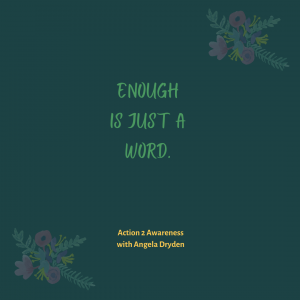
5 Tips for a Great Presentation
Tony Robins shares that we as humans have human needs and they are, certainty, variety, connection, contribution, growth, and significance. In daily life, you can


When it comes to putting other people first Co-Dependents are truly masters. I can recall doing things for others that I would have never done for myself. In my mind I saw these acts as being selfless, yet the fall out of my behavior after the fact was what showed me that I was not being as selfless as I thought.
Caring for others that are unable to care for themselves is a beautiful act of love. We care for our children and are rewarded for it in their smiles, hugs, and visible joy of just being with us. The problem can arrive as they get older and we begin to hold expectations of them because of the acts we perform for them. This is where placing guilt on them, and/or portraying a victim-like mentality can unfold as you are grasping to keep hold of your loved one.
There are other relationships where this can unfold such as older parents, siblings, co-workers, friends, and spouses, to name a few. Like I mentioned above, being a Caretaker is a beautiful thing, yet holding resentment and hurt feelings due to your expectations of being rewarded, or even acknowledged might not be useful behavior to grab hold of.
When our focus is on the doing and keeping up a certain facade, we can burn out our batteries long before recharge. The Co-Dependent behavior of being a Caretaker is exhausting, but we can exchange it for the Leading Lady behavior of Responsibility. This behavior exchange can be a challenging one depending on how long the caretaking has been going on. Those you have been caretaking for could feel abandoned and possibly try to manipulate you.

Even though there might be obstacles, I want to show it will be a blessing to you—and them—as you follow through in creating this new behavior. The old maxims of “You can’t give to others what you don’t have” or “How do you fill up someone’s cup when yours is empty?” are great reminders of why you might want to meet your needs first. Figuring out what you are responsible for could be painful as you think you are neglecting others. This is an opportunity for you to look within and ask yourself, “Is doing _____ going to make myself feel good now and later, regardless of their response and actions?”
Here are a few more questions you can ask yourself as you engage in the behavior of taking responsibility for your actions and not for others:

The clearer you can be with yourself, and form awareness around what is yours to handle, the more opportunity you are giving the other person to improve their self-esteem and awareness…and, over time, appreciation for their situation in life.
Helping other people is a blessing that you give yourself and others. There are times in life where things are out of your control. However, the way you respond as you contemplate and decide the best action to take can give you peace of mind. Most times the chaos from caretaking appears not at the beginning but as you live a life of quick decisions, instant gratification, and trying to control others.
Schedule your free discovery call here and let’s explore this together.
Get the Zoom link sent to your inbox and join the live call of the week.

Tony Robins shares that we as humans have human needs and they are, certainty, variety, connection, contribution, growth, and significance. In daily life, you can

Positive Thinking I love a great positive thought as much as the next person, daily affirmations, and aspiring quotes used to be a part of

I was at the store and saw many men buying chocolates, flowers, and stuffed animals. As a lady that will be married 24 years on

As a culture, we have gotten a little confused about the difference between worth and value in my opinion. A few things have helped me